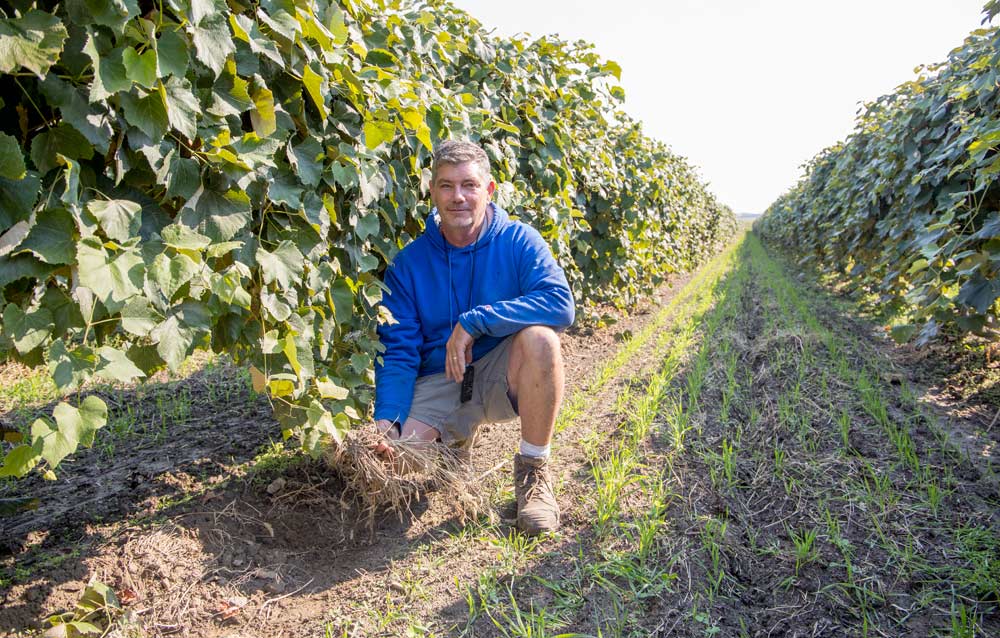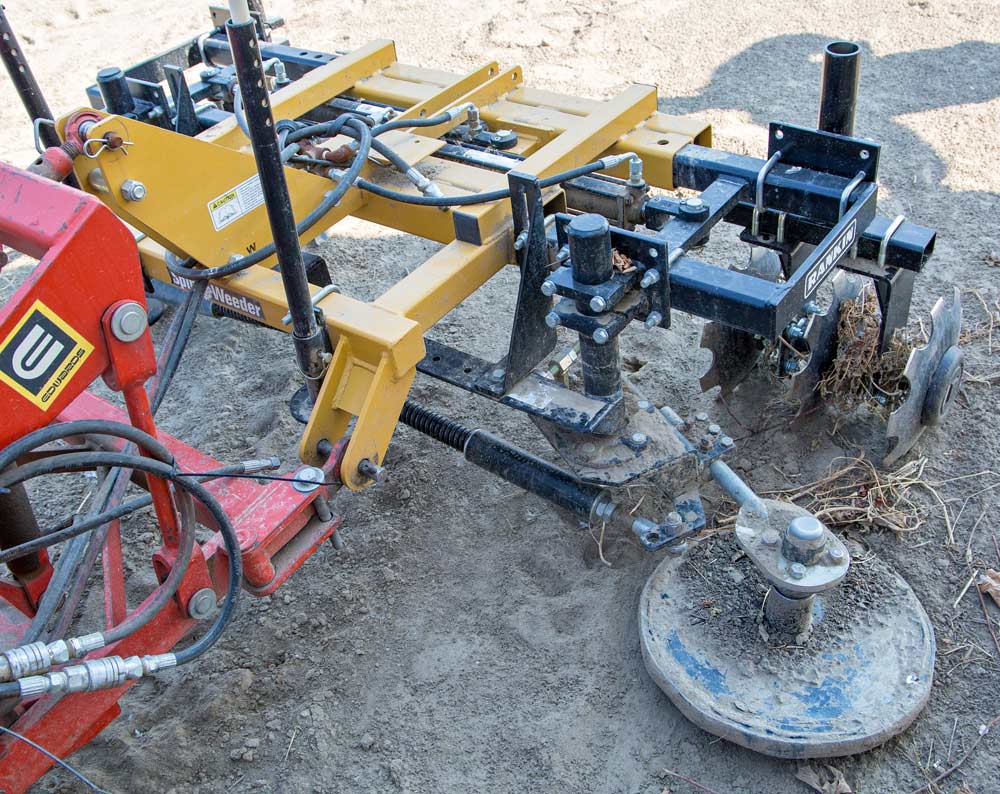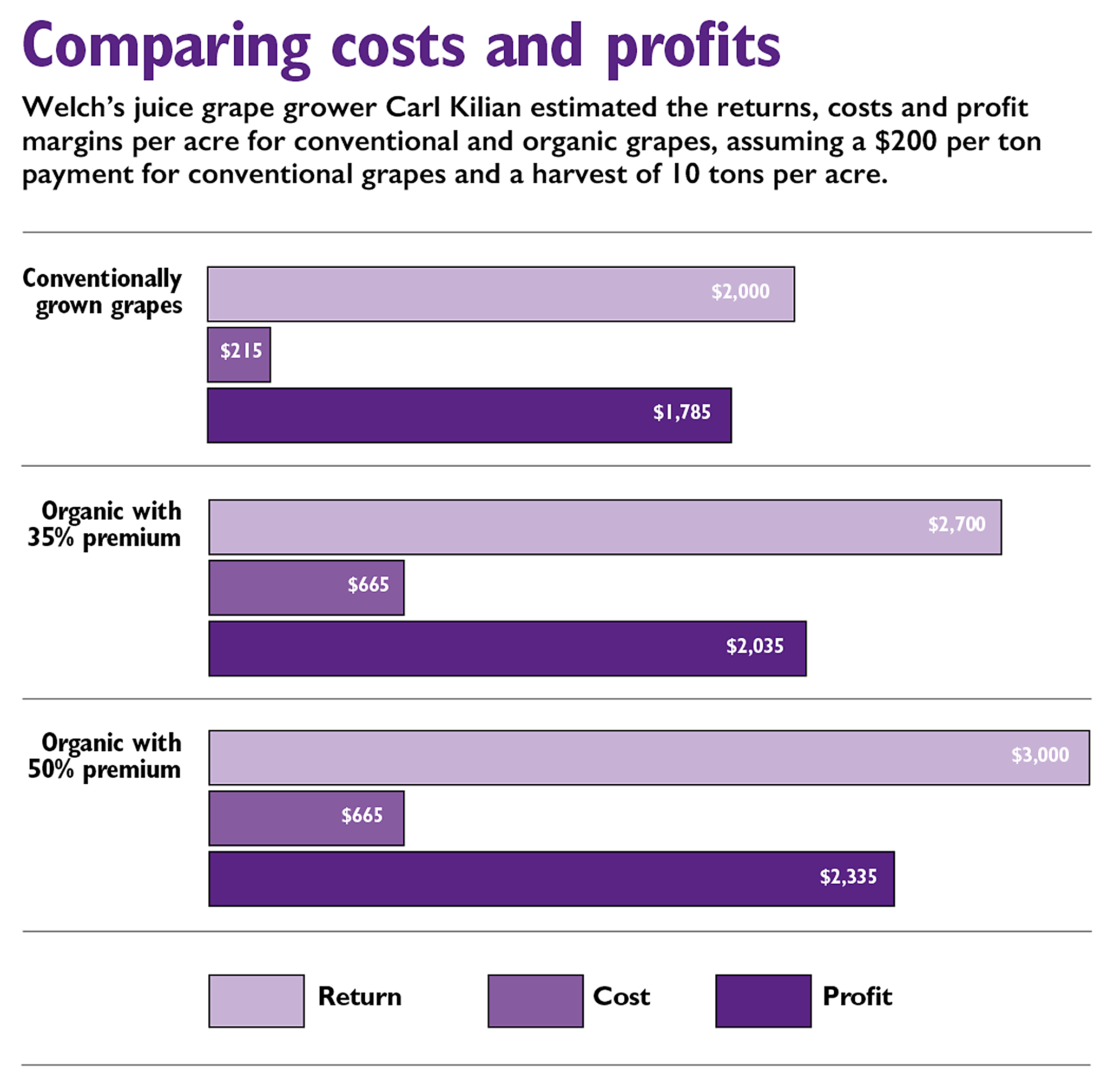
Weed control under vines is probably the biggest challenge for Carl Kilian, a Welch’s juice grape grower in Sunnyside, Washington, in making the transition to organic farming. Here, he holds up some dead weeds on a neighbor’s farm, dug up by a spin weeder mounted to a tractor. The green rows are rye vetch and peas planted as cover crops for fertilizer and weed control between rows. (Ross Courtney/Good Fruit Grower)
When Welch’s asked Carl Kilian to transition to organic juice grapes, he only agreed because he was already partway there — he had already been using fish and kelp, as well as planting cover crops, as alternatives to commercial nitrogen fertilizers.
Otherwise, he would have said no to the 35 percent premium over conventional that the juice grape cooperative offers its growers. “Fifty percent, I would go ahead and do it if you were just starting out,” he said.
In fact, he told as much to his fellow cooperative growers, breaking down the costs and benefits, at one of Welch’s meetings. “If you’re planning on doing it, don’t do it,” he recalled saying.
Welch’s, the processing and marketing subsidiary of the National Grape Cooperative based in Westfield, New York, has been recruiting some of its Washington growers to convert to organic to meet a growing demand, offering a 35 percent premium over the conventional price.
“There are customers out there who are asking for organically produced concentrate,” said Craig Bardwell, senior viticulture specialist in Grandview, Washington.

The spin weeder used by Kilian and his neighbor mounts to the front of a tractor. The horizontal wheel spins just under the surface of the ground to uproot weeds, swinging harmlessly out of the way on a spring-loaded hinge when it hits a sprinkler, post or vine trunk. (Ross Courtney/Good Fruit Grower)
The cooperative is focusing on Washington growers, where lower pest and disease pressure makes transitioning to organic more feasible than in the Michigan and New York growing regions.
Hot summers in Eastern Washington also make it easier for growers to achieve acceptable sugar levels. So far, the company is seeing between 3,000 tons and 5,000 tons — out of roughly 90,000 tons total — per year in Washington.
The biggest concerns for organic growers are weed control and nutrition, Bardwell said. Organic growers require more labor and more equipment operation.
Kilian, a third-generation juice grape grower, broke down the costs he has noticed on his grape farm. He has about 175 acres of juice grapes and is transitioning 100 of them. He also owns 23 acres of apples.
Overall, he estimates he spends $175 per acre on weed control on the organic grapes compared to $65 per acre conventional.
He had been using a weed burner but has recently teamed up with a neighbor — Troy Martin, another Welch’s organic grower — to use a spin weeder, a tractor mounted attachment that has two wheels that spin just under the soil to dislodge weeds under the rows. The wheels hinge on spring-loaded pivots to gently move out of the way when they hit a vine trunk.

Welch’s juice grape grower Carl Kilian estimated the returns, costs and profit margins per acre for conventional and organic grapes, assuming a $200 per ton payment for conventional grapes and a harvest of 10 tons per acre. (Jonelle Mejica/Good Fruit Grower)
Organic sprays didn’t work at the called-for rates, Kilian said. Applying more became way too expensive, in his opinion. “I wasn’t impressed.”
Controlling leaf hopper is another striking example. Kilian estimates it costs $3 per acre in conventional grapes and $65 per acre in organic grapes.
Stealing a page from the gardening playbook of his wife, Jeannie, he had been using a compost tea and fish and kelp for fertilizer. He plants vetch and peas in the winter and mows in the spring, letting the biomass hold down weeds and produce nitrogen and organic matter.
Those measures already marked steps toward organic farming, making a full conversion more palatable to him. However, if he has to use organic seeds for rye vetch and pea mix cover crops — and one inspector said he does — his costs go even higher.
All in all, he estimates he spends $215 per acre growing conventional grapes and $665 on organic grapes, more than three times as much. He is in his second year of transition.
Welch’s encouraged him to share the cost information with his fellow growers at one of the company’s routine grower meetings. “They just wanted us to give our honest opinion.” •
—by Ross Courtney






Leave A Comment